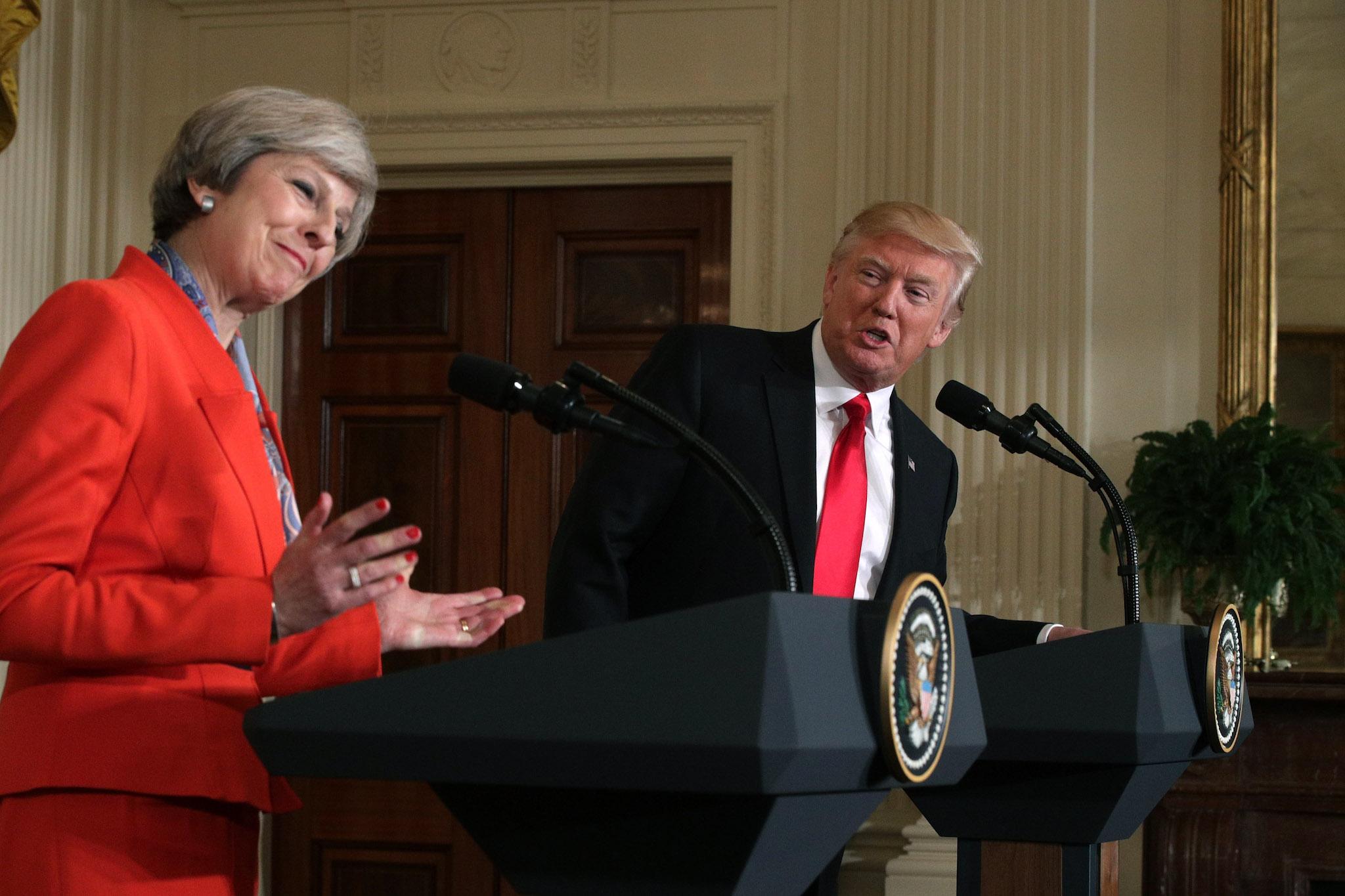Theresa May should now stop trying to hug the US close and instead stick close to the EU before it’s too late
Despite Trump’s rhetoric about a ‘very big and exciting’ trade deal the UK risks putting too many eggs in his basket


The most important lesson from Donald Trump’s inflammatory tweets is that the UK cannot rely on him to deliver a good trade deal. It is a lesson Theresa May must learn while there is still time.
There will be attempts to heal the wounds left by May rightly saying the US President was “wrong” to promote the xenophobic, far-right group Britain First. While a Trump state visit will probably go into the diplomatic long grass, it won’t be long before we’re told the “special relationship” is still intact.
British politicians complain about the media’s obsession with this anachronism, but on several prime ministerial trips to Washington, I’ve watched the very junior partner virtually beg the vastly senior one to utter the magic two words.
In January, May was desperate to be the first foreign leader to visit the White House after Trump’s inauguration, and desperate to talk up the prospects of a US-UK trade deal to show that Brexit might have an upside. Offering a trade deal to the protectionist “America First” President was not going to be enough to land the invitation. So May prematurely played her only other card – a queen – and dangled the pomp and show of Trump riding down The Mall in a royal carriage.
Now it’s crystal clear that Trump is an unreliable partner, happy to sacrifice his supposedly closest ally abroad for more crude pandering to his political base at home.
Brexiteers have always overstated the prospects of a US-UK free trade agreement. They claimed it would take only three years to conclude, even though the average US deal takes four. Trump has pulled out of the Trans-Pacific Partnership and threatens to leave the North American Free Trade Agreement with Mexico and Canada, which describes his negotiating strategy as “take, take, take”. Even if he wanted to fast-track a UK deal, the US Congress would probably prolong the process by insisting on line-by-line scrutiny.
Having left the European Union, Britain would be negotiating from a position of weakness, not one of strength. It would come under enormous pressure to accept lower regulatory standards for US imports – despite pledges by ministers to ban chlorinated chicken – and to allow American health giants a slice of the NHS market.
Despite Trump’s rhetoric about a “very big and exciting” trade deal, the UK risks putting too many eggs in his basket. Joseph Stiglitz, the Nobel Prize-winning economist, told the BBC on Friday it was a “waste of time” for the UK to expend “scarce resources” on starting US trade talks, warning that a deal might not enjoy much support in Congress.
The danger for May is that Britain falls between two stools – at great cost to the economy. Talk of cutting standards under a US-UK deal hardly furthers her goal of a “deep and special partnership” with the EU and “the freest and most frictionless trade possible in goods and services”.
Although I expect the 27 EU countries will agree this month to open talks on a trade agreement, that would only be the start of a long process and the two sides are poles apart.
For the EU, a level playing field on regulation is the top priority. British ministers think they can get a “Canada plus” deal – adding services to the free trade deal on goods between the EU and Canada. But they could be in for a nasty surprise. In Brussels, “Canada plus” is seen as doable only if the UK sticks to most EU regulations, which would dash Brexiteers’ hopes of diverging. Officials told me that Britain is much closer geographically and economically to the EU than Canada, so any slight divergence would hand the UK a big competitive advantage over the EU27.
May should look more to Norway than Canada. She should forget the Foreign Office mantra – “hug the US close” – and back Philip Hammond’s push to hug the EU close after Brexit. If we mirror EU regulations and strike a customs deal, we could secure a good free trade agreement with our biggest trading partner. We wouldn’t have to call it the single market and the customs union, just as we won’t during a 2019-21 transitional phase, even though that will in effect maintain the status quo. There would be another important gain: this would solve the otherwise insoluble problem of the border between Northern Ireland and Ireland.
True, Brexiteers would complain we were not really leaving the EU. But why gamble recklessly on unbankable trade deals before we are sure the dream of “Global Britain” can become reality? We could decide to diverge from the EU later if the deals are done.
The Trump tweets are a timely reminder that we have much more in common with our European neighbours than the current occupant of the White House. That should inform our approach to Brexit before it is too late.
Join our commenting forum
Join thought-provoking conversations, follow other Independent readers and see their replies
Comments